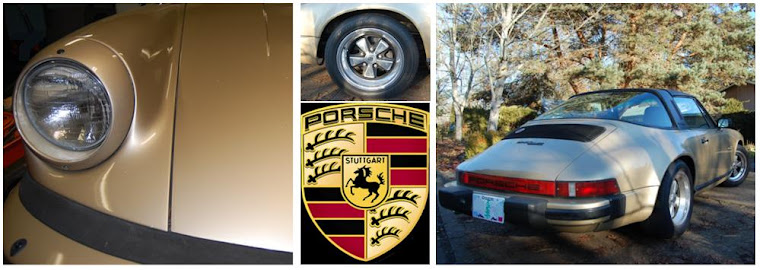I purchased the 911, in gas form, nearly two years ago. The registration expires next
month. Most gas vehicles where I live have to pass a vehicle emissions test as
a condition for registration renewal. By registering
the car as an electric powered vehicle, I will be exempt from the emissions
testing. I’ve heard countless tales of
bureaucratic confusion surrounding the process of registering a vehicle that
has been converted to run on electricity.
I was expecting and prepared for an ordeal. Fifteen minutes after stepping into the
department of motor vehicles office, my car was registered with the state of
Oregon as an electric powered vehicle.
The whole event took a little extra time because the clerk was so skeptical
that the process could actually be so painless that she called her supervisor over to
confirm that there was no inspection, documentation, extra fees, sworn and notarized
affidavit, or clearance from a mental health professional required to complete
the transaction. There was just a simple
change made to the database under fuel type: electric.
The supervisor commented that he was aware that a number of people
have installed fork lift motors on small pick-up trucks, like the Chevy S-10
and the Ford Ranger, but never on a vehicle that was nice, like a Porsche. The public perception of converted electric
vehicles is still dominated by anemic lead acid powered examples. Without knowing that lithium technology is now
viable, the concept of an electric sports car conversion would be incongruent. My goal that day was to walk out of the
office with registration stickers, and everything was going smoothly, so I didn’t
feel it was the proper time and place to explain that electric cars have changed and that my conversion could
outperform the stock gas configuration. The
phrase, “Anything you say can be used against you…” was on my mind.
After confirming that I was now exempted from pollution
testing, the clerk commented that I would also not be paying gas taxes, a tacit admonition that driving on public roads without paying the gas tax is dishonorable.
Oregon
was the first state in the United States to enact a fuel tax, back in 1919,
with the revenue to be used for building and maintaining the road system. I believe a road is a public good, and I support
funding well administered public goods.
I also support a tax based on fuel consumption, because it creates an
incentive to consume less fuel and produce less pollution. As the average fuel efficiency of road going
vehicles has increased over the years, and people are buying less fuel, the fuel tax revenue has been declining.
And so I wondered, just how much tax was I avoiding by
driving an electric car. In 2009, the
state of Oregon collected $1,394,000,000 USD for maintaining and building
roads and 13% of that total was derived
from the fuel tax. I’m still participating
in the other 87% of the revenue generating categories, so I’m OK with not
paying the gas tax and still using the public roads.
Here is how the rest of the
road funds in Oregon are sourced: 37% from the federal government, 25% from
bonds, and 13% from vehicle and motor carrier (commercial) fees. The remaining funds come from local sources,
and an official sounding category – miscellaneous.
(Source: U.S. Department of Transportation- Federal Highway
Administration: “Revenues Used by States on Highways”: 2009; http://www.fhwa.dot.gov/policyinformation/statistics/2009/sf3.cfm)
